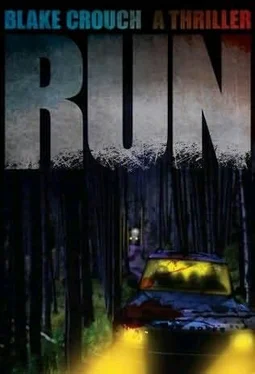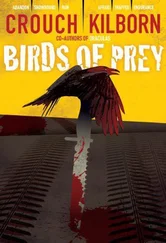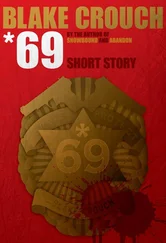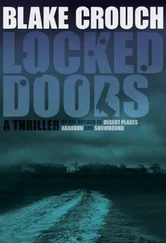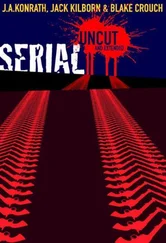A quarter mile into the woods, they stopped.
Someone said, “We’re at the perimeter.”
A voice squeaked back over a radio. “You’re clear.”
“We picked up a woman and two children. I’m going to have Liz put them in number fourteen. Have someone bring some food and water over. New clothes, too.”
“Copy that.”
Dee noticed light glinting off coils of razorwire straight ahead.
One of the men stepped on the wire where it sagged, made an opening for everyone to crawl through. They went on, and after another fifty feet, finally emerged from the woods. Under the moonlight, Dee could see a number of smaller buildings scattered through the clearing, satellites of a large, arched steel building.
Liz fell back and walked with them.
“You must be exhausted,” she said. “We’re going to put you up in a cabin. I want you to know that you’re safe here. See those?” She pointed toward opposing ends of the clearing where twenty-foot log towers stood near the edge of the forest. “There’s a heavily-armed man in each wearing night vision goggles. They’ll be watching over the clearing while you sleep.”
They were moving toward a grouping of small cabins now.
“I don’t understand. What is this place?” Dee asked.
“It’s our home.”
The cabin was clean and smaller than the shacks at the top of Togwotee Pass. There were two beds and a chair pushed under a desk and a chest of drawers. Sink and shower.
“We cut the generators off at night,” Liz said. She opened the top drawer and took out several candles and a box of matches. In a minute, candlelight warmed the room.
She came over to Dee and inspected her face.
“You’re covered in blood. I’ll make sure they bring a basin of water so you can clean up. The showers won’t run hot until morning.”
“Thank you, Liz.”
“I’ll leave you guys now. Food should be here soon.”
Dee stripped to her bra and panties, suddenly aware of how terrible she smelled. She bent down and dipped her face into the basin of water and wiped off the dried blood with a washcloth. Scrubbed her armpits, did a cursory cleaning of her arms and legs, but her hair still felt stringy and greasy.
Cole slept. Dee and Naomi sat on the other bed devouring the food that had been brought for them-a tray of fruit and cheese and crackers that tasted better than anything they’d ever eaten.
Dee stowed the Glock under the mattress. They crawled under the covers and it took some time before their body heat warmed the air between the mattress and the sheet, Dee spooning her daughter, sleep right around the corner.
Naomi whispered, “Do you think Dad’s dead?”
Felt like someone driving a spike through the ulcer in Dee’s stomach.
Tomorrow would be four days without him.
“I don’t know, Na.”
“Well, does it feel to you like he is?”
“I don’t know, baby. I can’t even think about it. Please just let me sleep.”
* * * * *
SHE’D just fallen asleep when the windows filled with dawnlight. Dee rose, pulled the curtains, climbed back into bed. Tried to sleep but her thoughts came frenetic and unstoppable. She got up again and went to the window and peered through the split in the curtain. A few people were out already, the long grass blanched with frost, and in daylight, the meadow appeared cluttered-two dozen one-room cabins like the one they occupied, three larger A-frames, the central steel building, and a number of semi-trailers standing along the edge of the woods, rusted all to hell and cemented with pine needles as if it had been centuries since their abandonment. Distant mountains peeked above the pine trees, and Dee sat on the surface of the desk watching the light color them in, and she was still sitting there two and a half hours later when the woman named Liz walked up the path to their cabin.
The main building was fifty feet wide, twice as long, and windowless. Bare lightbulbs dangled from the trusses and the amalgamation of voices caused a hollow, metallic resonance off the corrugated steel. Cheap folding tables had been pushed against the walls, leaving a wide row down the middle. Just inside the entrance, a chalkboard stand displayed: Hash Browns with Bacon & Cheese Omelet.
Liz led them to an empty table.
“We haven’t been able to get into town for several weeks, so we’ve been dipping into our MRE stash.”
“What’s an MRE?” Cole asked.
“Stands for Meal, Ready-to-Eat. It’s an army ration. We bought two truckloads last year.”
Dee could feel the stares coming from every direction, tried to focus on the blemishes in the plastic tabletop, ignoring that twinge in her gut like the first day of junior high and the minefield of the cafeteria.
A teenage girl appeared at the end of the table holding a basket filled with small, brown packages, plastic silverware, and a stack of tin bowls.
“Welcome,” she said.
The man who spoke after breakfast was slight and smoothshaven with thinning blond hair on the brink of turning white. He wore jeans and a plaid shirt and a black down vest. He stood on a table at the back of the mess hall so everyone could see him.
“No doubt you all heard the gunshots late last night. I’m happy to report that Liz and Mike and their team managed to take out the soldiers’ checkpoint at the road.”
Raucous applause broke out.
Someone yelled, “Freemen.”
Silence returned when he lifted his hand.
“No casualties on our end, and the really good news is that we took one alive. Badly wounded, but alive. Liz and Mike also managed to save three lives during the ambush.” He pointed back toward the entrance. “Dee, would you and your children stand up please.”
Dee took Cole’s hand and poked Naomi and they all rose.
“Thank you,” Dee said. She glanced down at Liz. “To you. To Mike, wherever you are, and all of the others who came. My children and I would be dead right now if it wasn’t for you. There’s not a doubt in my mind.”
“Why don’t you come on up here,” the man said.
Dee stepped around her chair and walked down the aisle. When she arrived at the table the man was standing upon, he reached down and opened his hand and pulled her up with him. Slipped his arm around her waist, put his lips to her ear, whispered, “Dee, I’m Mathias Canner. Introduce yourself. Tell us about your journey.”
She looked out over the crowd-fifty, maybe sixty faces staring back at her.
Managed a weak smile.
“I’m Dee,” she said. “Dee Colclough.”
Someone in the back yelled, “Can’t hear you.”
Later, she walked with Mathias. It was midmorning and the sun had cleared the forest wall. The dewy grass drying out. He showed her the well, the greenhouse and chicken coop, the gardens which had already been winterkilled.
“I bought this ninety-acre parcel twelve years ago,” he said. “Sold my business and moved out with several friends from Boise. Something, isn’t it?”
“What exactly brought you out here?”
“Wanting to live as a free man.”
“You weren’t free before?”
He waved to the bearded man up in the guard tower holding a sniper rifle. “Morning, Roger.”
“Morning.”
“All quiet?”
“All quiet.”
As Mathias led Dee into the trees, his right hand unsnapped the holster for the huge revolver at his side.
“Roger came to me nine years ago. He was an investment banker pulling down three mil a year and utterly miserable. The electrified razorwire starts fifty feet in and runs through the woods around the entire clearing. We’ve installed motion detectors at key points and six men walk the perimeter day and night. If I learn that you’re a spy or that you’ve lied to me in any way, I’ll kill your children in front of you, wait a day, and then kill you.”
Читать дальше
